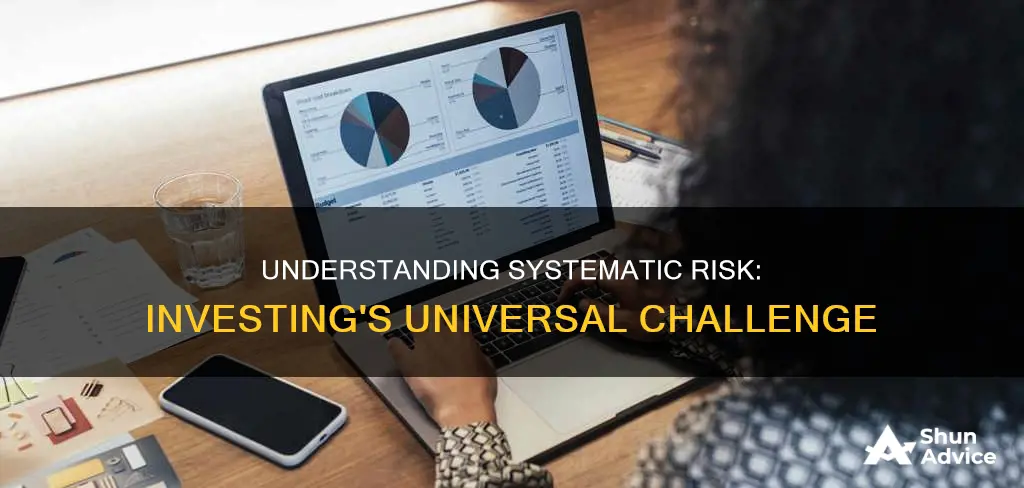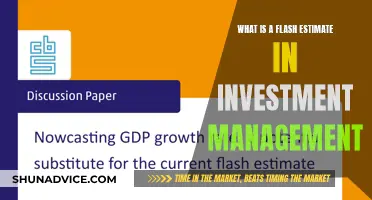
Systematic risk is a fundamental concept in finance that investors and analysts need to understand. It is the risk inherent to the entire market, rather than a specific company or industry, and is caused by factors beyond the control of a specific company, such as economic, political, and social factors. It can affect any type of investment portfolio and is a crucial factor when making important investment decisions.
| Characteristics | Values |
|---|---|
| Definition | Systematic risk, or total market risk, is price volatility that affects stocks across many industries, sectors, and asset classes |
| Factors | Economic, political, and social factors, such as inflation, fluctuation in interest rates and currencies, economic recession, and natural disasters |
| Impact | Shocks or uncertainty in the entire market, affecting any type of investment portfolio |
| Mitigation | Not possible to eliminate, but some mitigation or control is possible to some extent |
What You'll Learn

Systematic risk is dependent on market structure and dynamics
The common factors that lead to such a risk are inflation, fluctuation in interest rates and currencies, economic recession due to natural or man-made causes, and sudden natural disasters. These factors are beyond the control of a specific company, and they impact the entire market. For example, a recession affects all individuals involved in a market, as the values of every investment change in response. Stock prices fall, many investors sell their investments, and secure assets become more valuable.
Systematic risk is also influenced by the international economy, government policy mandates, and acts of nature. Currency or trade wars, for instance, can cause shocks to the entire market. While it is not possible to eliminate systematic risk, it can be mitigated or controlled to some extent.
Understanding systematic risk is crucial for making important investment decisions. By considering the market structure and dynamics, investors can assess the potential impact of external factors on their investment portfolios. This knowledge helps in making informed choices to minimise risk and maximise returns.
Smart Strategies to Turn $10K into $1 Million
You may want to see also

Systematic risk is inherent to the entire market
To qualify as systematic, these events must impact the entire market. For example, a recession impacts all individuals involved and invested in a market, as the values of every investment dramatically change in response. Stock prices fall, many investors sell investments, and secure assets become more valuable.
Systematic risk is also known as total market risk, as it is price volatility that affects stocks across many industries, sectors, and asset classes. Common factors that lead to such a risk include inflation, fluctuation in interest rates and currencies, economic recession due to natural or man-made causes, and sudden natural disasters.
It is not possible to eliminate systematic risk, but mitigation or control is possible to some extent. Such risk is dangerous to the economy, as it may indicate a slowing economy, sluggish business, and an impending recession.
Investing Abroad: A Guide for Indians
You may want to see also

Systematic risk is caused by factors beyond the control of a specific company
Systematic risk is a fundamental concept in finance that investors and analysts need to understand and identify. It is inherent in the broader market and can affect any type of investment portfolio. It is caused by factors beyond the control of a specific company, such as economic, political, and social factors. For example, a recession impacts all individuals involved and invested in a market, as the values of every investment dramatically change in response. Stock prices fall, many investors sell investments, and secure assets become more valuable.
Systematic risk is dependent on market structure and the dynamics that may result in shocks or uncertainty in an entire market. These shocks can originate from a variety of sources, such as the international economy, government policy mandates, or acts of nature. To qualify as systematic, it is essential that these events impact the entire market.
The common factors that lead to such a risk are inflation, fluctuation in interest rates and currencies, economic recession due to natural or man-made causes, and any sudden natural disaster. It is not possible to eliminate these factors, but mitigation or control is possible to some extent. Such risks are dangerous to the economy, as they may indicate a slowing economy, sluggish business, and an impending recession.
Systematic risk, or total market risk, is price volatility that affects stocks across many industries, sectors, and asset classes. It is important to understand and identify systematic risk to make crucial investment decisions.
Chegg's Investment Acceptance: Managerial Decisions Explored
You may want to see also

Systematic risk is also known as total market risk
Systematic risk, also known as total market risk, is the risk inherent to the entire market, rather than impacting only one specific company or industry. It is dependent on market structure and the dynamics that may result in shocks or uncertainty in an entire market. These shocks can originate from a variety of sources like the international economy, government policy mandates or acts of nature.
The common factors that lead to such a risk are inflation, fluctuation in interest rates and currencies, economic recession due to natural or man-made causes, and any sudden natural disaster. It is not possible to eliminate these factors but mitigation or control is possible to some extent.
Systematic risk is a fundamental concept in the field of finance that investors or finance analysts need to understand and identify. It is dangerous to the economy as it may indicate a slowing economy, sluggish business, and an impending recession.
Systematic risk is that part of the total risk that is caused by factors beyond the control of a specific company, such as economic, political, and social factors.
Aggressive Investment Plans: High-Risk, High-Reward Strategies
You may want to see also

Systematic risk is a fundamental concept in finance
Systematic risk is also known as total market risk, as it is the price volatility that affects stocks across many industries, sectors, and asset classes. It is caused by factors beyond the control of a specific company, such as economic, political, and social factors. Common factors that lead to such risks include inflation, fluctuation in interest rates and currencies, economic recession due to natural or man-made causes, and natural disasters.
It is not possible to eliminate systematic risk, but it can be mitigated or controlled to some extent. It is crucial for investors and financial analysts to understand and identify this type of risk, as it can affect any type of investment portfolio and is a key factor when making important investment decisions. When rampant, systematic risk may indicate a slowing economy, sluggish business, and an impending recession.
Wall Street Investment Guide for Indians: Getting Started
You may want to see also
Frequently asked questions
Systematic risk, or total market risk, is price volatility that affects stocks across many industries, sectors, and asset classes. It is dependent on market structure and the dynamics that may result in shocks or uncertainty in an entire market.
Common factors that lead to systematic risk are inflation, fluctuation in interest rates and currencies, economic recession due to natural or man-made causes, and natural disasters.
No, it is not possible to eliminate systematic risk. However, it can be mitigated or controlled to some extent.







